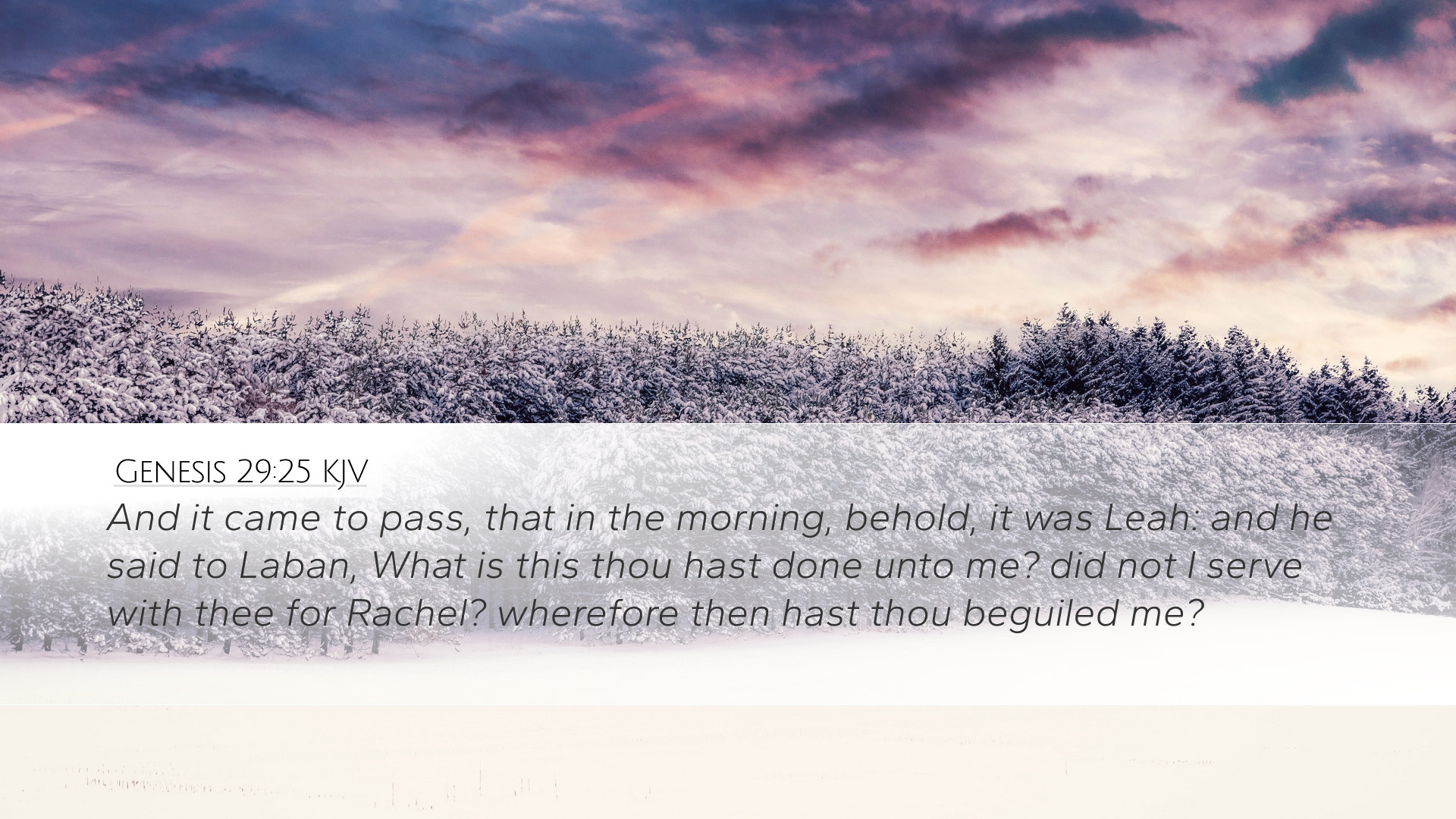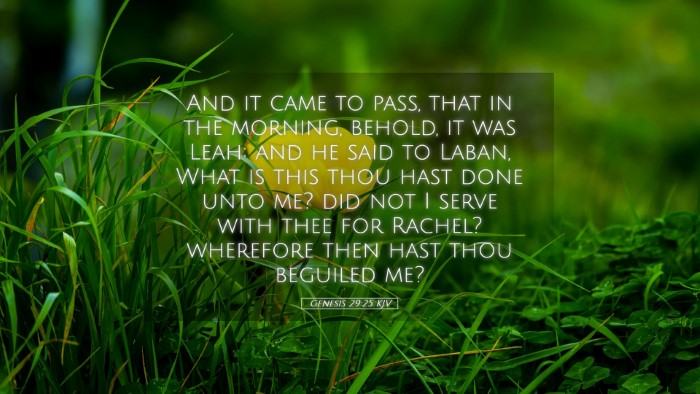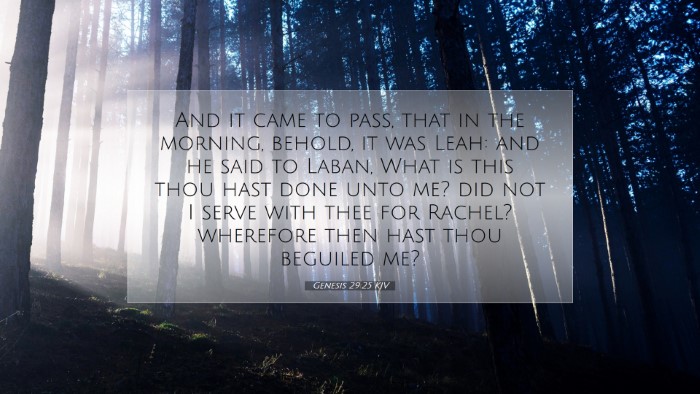Commentary on Genesis 29:25
In Genesis 29:25, we encounter a pivotal moment in the life of Jacob, manifesting the complexities of human relationships, deception, and divine providence. The verse reads:
“And it came to pass, that in the morning, behold, it was Leah: and he said to Laban, What is this thou hast done unto me? did not I serve with thee for Rachel? wherefore then hast thou beguiled me?”
Contextual Background
This incident occurs after Jacob flees his home to escape his brother Esau's wrath. Engaging in a socio-familial context, he arrives at Haran, where he encounters Laban, his maternal uncle. Jacob’s primary motive for coming to Laban's household is to find a wife, specifically Rachel, whom he loves. The events leading to Leah being given to Jacob instead of Rachel highlight themes of expectation, surprise, and the consequences of human deceit.
Insights from Matthew Henry
Matthew Henry emphasizes the providential oversight of God in the seemingly unjust circumstances surrounding Jacob. He notes that Jacob, characterized by his earlier deception of his father Isaac, encounters a similar trickery in Laban. This moment serves as a critical reflection on the principle of reaping what one sows—Jacob’s own deceit in gaining his brother’s blessing parallels this experience of being deceived in love.
-
The Role of Divine Providence: Henry suggests that God’s hand is evident even in human folly, guiding Jacob's life despite his questionable choices.
-
The Irony of Deception: The very traits that enabled Jacob to procure Esau's birthright lead to his downfall, illustrating the notion that one cannot escape the shadows of their actions.
Insights from Albert Barnes
Albert Barnes elaborates on the emotional turmoil Jacob experiences upon realizing he has been tricked. He points out that this is not merely a matter of romantic disappointment; rather, it encapsulates a theme of betrayal and its consequences. Laban's actions are depicted as a cautionary tale of familial loyalty being overshadowed by greed.
-
Faithfulness and Injustice: Barnes contemplates how Jacob’s years of hard work and commitment are abruptly met with treachery, raising questions about fairness and divine justice.
-
Emotional Contrast: The joy of marrying Rachel becomes juxtaposed with the shock of Leah’s unintended presence, highlighting the pathos of unmet expectations.
Insights from Adam Clarke
Adam Clarke’s commentary focuses on the cultural significance of the event. He describes the custom of veiling brides, which allows for Laban’s ruse. Clarke provides a deeper understanding of the societal dynamics that allow such deception to flourish, emphasizing the lack of agency experienced by women within these traditions.
-
Cultural Practice: Clarke notes that the veil served as a symbol of modesty yet also a means for dishonesty, reflecting the moral complexities in social customs.
-
Theological Reflection: He urges readers to contemplate God’s sovereign will amid human scheming. Jacob’s journey foreshadows a greater Plan of Redemption wherein God uses flawed individuals to fulfill His purposes.
Theological Implications
In analyzing Genesis 29:25, several key theological themes emerge that resonate with contemporary faith discussions:
-
The Nature of God’s Providence: The narrative challenges believers to recognize God’s hand even in moments of trouble and deception. We learn that God's plans may unfold through human actions, however fallible they might be.
-
The Complexity of Human Relationships: The text invites pastors and theologians to explore the intricate dynamics of love, commitment, and betrayal. Jacob’s story reveals how personal desires can lead to unintended spiritual crises.
-
The Call for Integrity: This passage serves as a reminder of the imperative for integrity and honesty in personal dealings. Jacob’s life becomes a pilgrimage through trials, reflecting the need for personal growth despite setbacks.
Pastoral Reflections
For pastors, this verse serves as a poignant reminder to guide congregations through the complexities of life’s disappointments. It provides a rich context for discussing themes of trust, patience, and forgiveness:
-
Encouraging Patience: Like Jacob, believers often find themselves in periods of waiting and testing. Pastoral care can center on helping individuals endure these trials with faith.
-
Processing Hurt and Betrayal: The church must minister to those who experience betrayal, reflecting on this narrative as a means of healing and understanding.
-
Pointing to Redemption: Ultimately, the larger biblical narrative reveals God using Jacob’s story for His redemptive purposes, encouraging congregations to view their stories through the lens of God’s grace and ultimate plan.
Conclusion
In conclusion, Genesis 29:25 encapsulates a moment filled with dramatic irony and profound implications for understanding human nature and God’s sovereign dealings with mankind. The insights drawn from public domain commentaries contribute significantly to a deeper theological understanding while prompting meaningful reflection for scholars, pastors, and students alike. This text urges all readers to embrace both the joy and the challenge of faith as they navigate their relationships and experiences in a world marred by both grace and disappointment.


